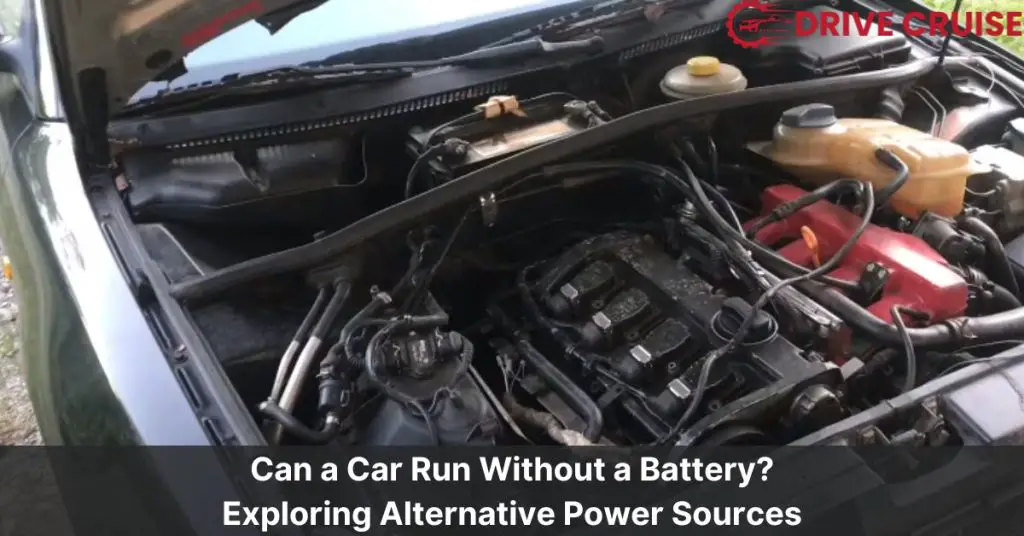Have you ever wondered if your car can run without a battery? It’s a common question that many drivers have asked at some point. A dead car battery can be a frustrating experience, especially if you’re in a hurry or far from home. But is it possible for your car to keep running even without a battery?
To answer this question, we need to understand how a car’s electrical system works. The battery is an essential component that provides the initial power needed to start the engine. Once the engine is running, the alternator takes over and provides the necessary power to keep the car running and charge the battery. But can a car continue to operate without a battery once it’s started?
In this guide, we’ll explore the technicalities of car operation, including the role of the battery and the alternator. We’ll also examine different scenarios and conditions that may affect whether a car can run without a battery. By the end of this guide, you’ll have a better understanding of whether a car can truly function entirely without one.
Separating Fact from Fiction: Understanding a Car’s Electrical System
To understand if a car can run without a battery, we need to dissect its electrical system. Here’s a breakdown of the key players:
The Battery: Powerhouse and Regulator
Function: The car battery acts as the primary source of electrical power. It stores energy generated by the alternator and supplies it to various electrical components like the starter motor, ignition system, fuel pump, and headlights.
Voltage Regulation: The battery also plays a crucial role in regulating voltage throughout the car’s electrical system, ensuring a smooth and stable flow of electricity.
The Alternator: Generating Power While You Drive
Function: The alternator is a belt-driven component that converts mechanical energy from the engine’s rotation into electrical energy. This energy is then used to charge the battery and power various electrical systems while the car is running.
The Starter Motor: Cranking the Engine to Life
Function: The starter motor is a powerful electric motor that utilizes a large burst of current from the battery to crank the engine during startup. Once the engine starts and the alternator takes over, the starter motor is not continuously engaged.
Based on the above information, we can conclude that a car cannot run without a battery. The battery is essential for powering various electrical components, including the starter motor, which is required to crank the engine during startup. However, it is possible for a car to continue running even if the battery is dead or disconnected, as long as the alternator is generating enough power to keep the engine running and power the other electrical systems.
It’s important to note that while a car can technically run without a battery, it’s not recommended. Without a battery, the car’s electrical system will be unstable, and there will be no backup power source in case the alternator fails. Additionally, disconnecting the battery while the car is running can cause damage to the alternator and other electrical components due to the sudden surge of voltage.
The Big Question: Can a Car Run Without a Battery?
If you’re ever stuck with a dead battery and no jump-start cables, you might wonder if your car can run without a battery. The answer is a bit complicated, but the short answer is no, a car cannot run without a battery. However, there are some caveats to that answer.
Technically Yes, with a Running Start
In theory, if your car’s engine is already running and the alternator is functioning properly, it can continue to generate electricity and power the vehicle’s electrical systems for a short period even without a battery. The alternator can produce enough power to run the engine while also powering other electrical components. This means that your car can still move and operate for a short period, but it is not recommended to drive without a battery.
Crucial Caveat: Starting the Engine is the Challenge
The critical hurdle lies in starting the engine without a battery. The starter motor requires a large surge of current, which a depleted battery cannot provide. In other words, without a battery, there is no way to start your car. This means that if your battery is dead, you will need to jump-start it or replace it before you can start your car.
The Short Run Downside: Limitations of Running Without a Battery
Even if you manage to get your car running without a battery, there are significant limitations that you should keep in mind.
Unstable Electrical System
Without the battery’s voltage regulation, the alternator’s output might fluctuate, potentially damaging sensitive electronic components in your car. This could lead to costly repairs or even render your car inoperable.
Limited Electrical Functionality
Headlights, audio systems, and other non-essential electrical components might not function or operate erratically without the battery’s buffering capabilities. This could make driving at night or in inclement weather extremely dangerous.
Risk of Stalling
If the engine stalls for any reason, restarting it becomes impossible without a battery. This could leave you stranded in the middle of nowhere or in a dangerous situation.
Conclusion: The Battery – A Vital Partner, Not a Silent Bystander
As you have learned, a car can technically run without a battery for a short period of time, but it is not an advisable practice. The battery is not just an accessory for powering the starter motor. It plays a vital role in maintaining a stable electrical system, ensuring a smooth and uninterrupted flow of power to all components of the vehicle.
The battery also acts as a safeguard against voltage fluctuations, which can cause damage to sensitive electronic components. Without a battery, your car’s electrical system would be vulnerable to sudden surges and spikes in voltage, leading to costly repairs.
Regularly maintaining your car battery is crucial for optimal vehicle performance and a smooth driving experience. This includes checking the battery’s charge level, cleaning the terminals, and replacing the battery when necessary. Neglecting your battery can lead to a host of problems, including difficulty starting the engine, dimming headlights, and even stalling while driving.
In summary, while it may be possible to run your car without a battery for a short period, it is not recommended. The battery is a vital partner in your vehicle’s electrical system, ensuring stable power delivery and protecting against voltage fluctuations. By properly maintaining your car battery, you can ensure optimal vehicle performance and a safe, smooth driving experience.
Related Posts:
- Can a Car Run Without a Battery? Exploring Alternative Power Sources
- Goodyear Assurance WeatherReady Review: A Friendly Guide to Choosing the Right Tires
- How to Reset Dashboard Lights: A Simple Guide
- JLG Scissor Lift Warning Light Flashing: What It Means and What to Do
- NOCO Boost Plus GB40 Review: The Ultimate Portable Jump Starter
- Prius P Lock Malfunction: What to Do When Your Prius Won’t Start
- Reason Why Your Transmission Won’t Shift into Overdrive
- Toyota Prius Dashboard Light Not Working: Troubleshooting Tips
- When Are Cracks in Tire Tread Unsafe? A Guide to Knowing When to Replace Your Tires
- Where is the Spare Tire in a Dodge Caravan? A Quick Guide











